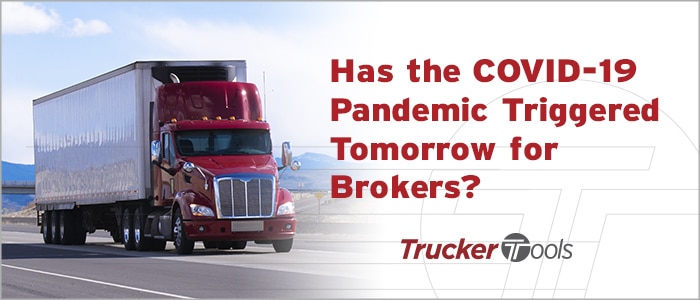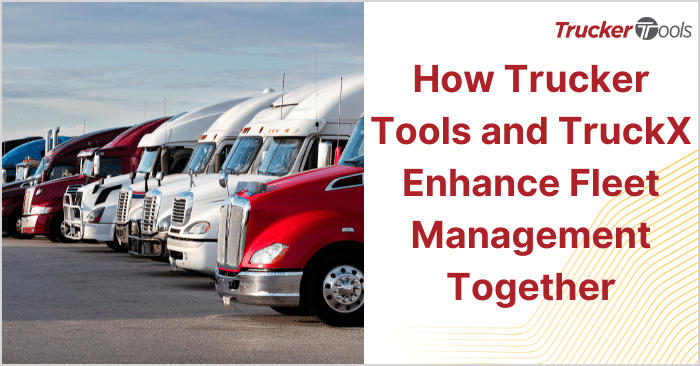In June, Trucker Tools hosted a webinar panel discussion on Strategies for Brokers on Surviving the Current Market and Thriving in Recovery with Bill Cassidy of JOC, John Schulz of Logistics Management Magazine and Avery Vise of FTR Transportation Intelligence. The discussion was moderated by Trucker Tools’ CEO and founder, Prasad Gollapalli and centered on the challenges brokers were facing in the early days of the COVID-19 pandemic. We recently invited our panel of experts back for a follow-up webinar and discussion, Persevering in a Pandemic: What Brokers and Carriers Should Plan for as We Enter the Fall Months, to talk about what brokers and carriers can do to strengthen their businesses as we enter autumn.
A recurring theme in both panel discussions was how the pandemic has accelerated the need for technology-based solutions in freight brokerage. Instead of putting off technology implementations and investments, many are rolling out new technology-based solutions in their operations to both deal with the challenges of the pandemic and prepare for the future.
In many ways, tomorrow has come early for the freight brokerage industry, making the automation of tasks such as load tracking, truck procurement, load booking and BOL submission a top priority.
Digitization Leads the Way
For many freight brokers, one of the early challenges of the COVID-19 pandemic was how to transition from an office-based work environment to a remote work environment. Freight brokers and 3PLs who had digital workflows and systems in place obviously fared better than those who were relying purely on manual tasks for load tracking, truck procurement, truck bookings and submission of BOL/POD docs.
Digital workflows and processes offer more than the ability to work remotely. When the market was at its worst in the early days of COVID-19, brokers and 3PLs who were already using automated workflows and processes in their operations were able to scale up freight volume with relative ease. For brokers whose operations are completely manual, increasing freight volume requires an additional investment in human resources, which often doesn’t make financial sense.
Efficiency at the Center of Your Strategy for the Future
Success in the current freight brokerage market and in the future is all about harnessing the transformative power of technology to reduce inefficiencies. As such, any strategy for your freight brokerage or logistics company should center on increasing efficiency, say our panelists.
“The focus should be to invest in technology to do what you don’t need a person to do,” said Avery Vise of FTR Transportation Intelligence. “Reduce manual tasks and focus on your best people.”
According to John Schulz of Logistics Management Magazine, operational efficiency and nimbleness is the winning combination if you want to both survive the pandemic and thrive in the future.
“Companies are looking at their supply chains and how well they can build flexibility into their processes,” says Schulz. “A lot of that depends on technology and greater visibility, as well as better communication by all parties involved.”
Bill Cassidy of JOC advises brokers and 3PLs to find solutions to improve costs, and to focus on being a problem-solver for your shipper customers.
“Trucking is going to be a technology play in the future, no matter how you look at it. Companies are going to need to automate and digitize more processes,” says Cassidy.
However, notes Cassidy, automation and digitization doesn’t necessarily diminish the value or need for staff members in your brokerage operations. Instead, technology should help your staff members perform at a higher level and ultimately provide better service to your customer base.
“We talk about automation and digitization as if it means getting rid of jobs, but that shouldn’t be the case,” Cassidy said. “What it should mean is that we’re making it easier for people to do their jobs. The job within the brokerage should not simply be answering the phones, it should be helping that shipper customer find the solutions it needs in order to improve its own transportation system and reduce costs.”
Vise agreed with Cassidy on this point, advising, “Think of your human capital not just as filling chairs, but as who are the best people to differentiate your business from other companies. Use technology to automate everything else.”
Why the Future is All About Digital Freight Matching
One area of freight brokerage that invites greater digitization and automation is truck procurement.
“The focus of digital freight matching is to invest in technology that basically does what you do not need a person to do,” Vise notes. “It’s becoming very scalable. Five years ago or certainly 10 years ago, you had to be a major player to take advantage of this technology. Increasingly, you’re able to do leverage this technology in an economical way.”
As Vise notes, digital freight matching isn’t just for the mega brokers. With Trucker Tools’ digital freight matching, you can find truck capacity with preferred carriers in a matter of seconds, whether you’re a micro or mega broker, or somewhere in between. Instead of using phone calls, emails, load boards and other manual processes for finding capacity, let Trucker Tools’ digital freight matching do the work. Using digital freight matching in your operations increases efficiency and gives your staff members more time to devote to providing outstanding shipper service.
For more on how Trucker Tools’ digital freight matching can take your brokerage to the next level, read Five Reasons To Use Trucker Tools’ Digital Freight Matching for Brokers. To schedule a demo of Trucker Tools’ digital freight matching, real-time visibility platform and Book-It-Now®, contact our sales team.







